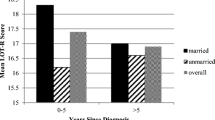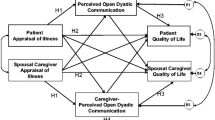Abstract
Purpose
An estimated 10–40 % of breast cancer (BC) patients report negative changes to their partnered relationships. Literature suggests that for these patients, marital satisfaction is related to depression and other quality of life factors which are associated with survivorship and treatment response. However, existing literature does not provide a clear explanation of the factors that strengthen vs. create strain in couples facing cancer. Given the benefits of a satisfying relationship to patient quality of life, it is important to better understand factors that put patients at greater risk for marital difficulties. This study examined the differential and combined roles of hope and optimism among BC patients and their partners on patient marital satisfaction.
Method
Fifty-six breast cancer patient-partner dyads completed study questionnaires as part of a larger study. Regression analyses were used to examine the main and interaction effects of patient and partner hope and optimism on patient marital satisfaction.
Results and conclusion
Higher patient and partner hope predicted greater patient marital satisfaction, whereas optimism did not. These results are divergent from the literature on optimism and well-being, which shows the importance of studying these two traits concurrently. Interaction effects suggest certain combinations of patient and partner hope and optimism are more beneficial than others for patient marital satisfaction and suggest a dyadic approach is important for investigation of well-being in breast cancer.


Similar content being viewed by others
References
Shapiro SL, Lopez AM, Schwartz GE, Bootzin R, Figueredo AJ, Braden CJ, Kruker SF (2001) Quality of life and breast cancer: relationship to psychosocial variables. J Clin Psychol 57:501–519
Moreira H, Canavarro MC (2013) Psychosocial adjustment and marital intimacy among partners of patients with breast cancer: a comparison study with partners of healthy women. J Psychosoc Onc 31:282–304
Kayser K, Sormanti M (2002) A follow-up study of women with cancer: Their psychosocial well-being and close relationships. Soc Work Health Care 35:391–406. doi:10.1300/J010v35n01_04
Wai Ming VM (2002) Psychological predictors of marital satisfaction in breast cancer patients. Psychol Health Med 7:37–51. doi:10.1080/13548500120101540
Manne S, Ostroff J, Winkel G, Goldstein L, Fox K, Grana G (2004) Posttraumatic growth after breast cancer: patient, partner, and couple perspectives. Psychosom Med 66:442–454. doi:10.1097/01.psy.0000127689.38525.7d
Dalton WT, Nelson DV, Brobst JB, Lindsay JE, Friedman LC (2007) Psychosocial variables associated with husbands’ adjustment three months following wives’ diagnosis of breast cancer. J Cancer Educ 22:245–249. doi:10.1080/08858190701638764
Weihls K, Enright T, Howe G, Simmens SJ (1999) Marital satisfaction and emotional adjustment after breast cancer. J Psychosoc Oncol 17:33–49
Coates AS, Hurny C, Peterson HF, Bernhard J, Castinglione-Gertsch M, Gelberg D, Goldhirsch A (2000) Quality of life scores predict outcome in metastatic but not early breast cancer. International Breast Cancer Study Group. J Clin Oncol 18:3768–3774
Fraser SCA, Ramirez AJ, Ebbes SR, Fallowfield LJ, Dobbs HJ, Richards MA, Bates T, Baum M (1993) A daily diary for quality of life measurement in advanced breast cancer trials. Br J Cancer 67:341–346
Seidman AD, Portenoy R, Yao TJ, Lepore J, Mont EK, Kortmansky J, Onetto N, Ren L, Grechko J, Beltangady M et al (1995) Quality of life in phase II trials—a study of methodology and predictive value in patients with advanced breast cancer treated with paclitaxel, plus granulocyte colony stimulating factor. J Natl Cancer Inst 187:1316–1322
Goodwin JS, Zhang DD, Ostir GV (2004) Effect of depression on diagnosis, treatment, and survival of older women with breast cancer. J Am Geriatr Soc 52:106–111
Aspinwall LG, Tedeschi RG (2010) The value of positive psychology for health psychology: progress and pitfalls in examining the relation of positive phenomena to health. Ann Behav Med 39:4–15
Aspinwall LG, MacNamara A (2005) Taking positive changes seriously. Cancer 104:2549–2556
Scheier MF, Carver CS, Bridges MW (1994) Distinguishing optimism from neuroticism (and trait anxiety, self-mastery, and self-esteem): a reevaluation of the Life Orientation Test. J Pers Soc Psychol 67:1063–1078. doi:10.1037/0022-3514.67.6.1063
Snyder CR, Harris C, Anderson JR, Holleran SA, Irving LM, Sigmon ST, Harney P (1991) The will and the ways: development and validation of an individual-differences measure of hope. J Pers Soc Psychol 60:570–585. doi:10.1037/0022-3514.60.4.570
Snyder CR (2002) Hope theory: rainbows in the mind. Psychol Inq 13:249–275. doi:10.1207/S15327965PLI304_01
Stanton AL, Danoff-Burg S, Cameron CL, Bishop M, Collins CA, Kirk SB, Sworowski LA, Twillman R (2000) Emotionally expressive coping predicts psychological and physical adjustment to breast cancer. J Consult Clin Psychol 68:875–882
Carver CS, Smith RG, Petronis VM, Antoni MH (2006) Quality of life among long-term survivors of breast cancer: different types of antecedents predict different classes of outcomes. Psycho-Oncol 15:749–758
Snyder CR, Feldman DB (2000) Hope for the many: an empowering social agenda. In: Snyder CR (ed) Handbook of hope: theory, measures, and applications. Academic, San Diego, pp 402–415
Srivastava S, McGonigal KM, Richards JM, Butler EA, Gross JJ (2006) Optimism in close relationships: how seeing things in a positive light makes them so. J Pers Soc Psychol 91:143–153. doi:10.1037/0022-3514.91.1.143
Bryant FB, Cvengros JA (2004) Distinguishing hope and optimism: two sides of a coin, or two separate coins? J Soc Clin Psychol 23:273–302. doi:10.1521/jscp.23.2.273.31018
Rand KL (2009) Hope and optimism: latent structures and influences on grade expectancy and academic performance. J Pers 77:231–260. doi:10.1111/j.1467-6494.2008.00544.x
Rand KL, Cripe LD, Monahan PO, Tong Y, Schmidt K, Rawl SM (2012) Illness appraisal, religious coping, and psychological responses in men with advanced cancer. Support Care Cancer 20:1719–1728. doi:10.1007/s00520-011-1265-y
Chang EC (1998) Dispositional optimism and primary and secondary appraisal of a stressor: controlling for confounding influences and relations to coping and psychological and physical adjustment. J Pers Soc Psychol 74:1109–1120
Ruiz JM, Matthews KA, Scheier MF, Schulz R (2006) Does who you marry matter for your health? Influence of patients’ and spouses’ personality on their partners’ psychological well-being following coronary artery bypass surgery. J Pers Soc Psychol 91:255–267
Badr H, Carmack CL, Kashy DA, Cristofanilli M, Revenson TA (2010) Dyadic coping in metastatic breast cancer. Health Psychol 29:169–180
Wagner CD, Bigatti SM, Storniolo AM (2006) Quality of life of husbands of women with breast cancer. Psycho-Oncol 15:109–120
Kerenyi LM (2008) A structural analysis of the impact of breast cancer on positive and negative domains of quality of life. (Doctoral Dissertation, State University of New York at Buffalo, 2007). Dissertation Abstracts International: Section B: The Sciences and Engineering, 68(9-B), 6312
Cohen S, Herbert TB (1996) Health psychology: psychological factors and physical disease from the perspective of human psychoneuroimmunology. Annu Rev Psychol 47:113–142
Lewis FM, Hammond MA (1992) Psychosocial adjustment of the family to breast cancer: a longitudinal analysis. J Am Med Womens Assoc 47:194–200
Manne SL (1999) Intrusive thoughts and psychological distress among cancer patients: the role of spouse avoidance and criticism. J Consult Clin Psychol 67:539–546
Manne SL, Glassman M (2000) Perceived control, coping efficacy, and avoidance coping as mediators between spouses’ unsupportive behaviors and cancer patients’ psychological distress. Health Psychol 19:155–164
Sorenson JB, Klee M, Palshof T, Hansen HH (1993) Performance status assessment in cancer patients. An inter-observer variability study. Br J Cancer 67:773–775
McNair DM, Lorr M, Droppelman LF (1992) EDITS manual for the Profile of Mood States, San Diego, CA: Educational Testing Service
Guadagnoli E, Mor V (1989) Measuring cancer patients’ affect: revision and psychometric properties of the profile of mood states (POMS). Psychol Assess 1:150–154
Andrykowski MA, Brady MJ, Hunt JW (1993) Positive psychosocial adjustment in potential bone marrow transplant recipients: cancer as a psychosocial transition. Psycho-Oncol 2:261–276
Andrykowski MA, Curran SL, Studts JL, Cunningham L, Carpenter JS, McGrath PC, Kenady DE (1996) Psychosocial adjustment and quality of life in women with breast cancer and benign breast problems: a controlled comparison. J Clin Epidemiol 49:827–834
Locke HJ, Wallace KM (1959) Short marital-adjustment and prediction tests: their reliability and validity. Marriage Fam Living 21:251–255
Aiken LS, West SG (1991) Regression: testing and interpretating interactions. SAG Publications Inc, Thousand Oaks, CA
Helgeson VS, Snyder P, Seltman H (2004) Psychological and physical adjustment to breast cancer over 4 years: identifying distinct trajectories of change. Health Psychol 32:3–15. doi:10.1037/0278-6133.23.1.3
Carver CS, Pozo C, Harris SD, Noriega V, Scheier MF, Robinson DS, Clark KC (1993) How coping mediates the effect of optimism on distress: a study of women with early stage breast cancer. J Pers Soc Psychol 65:375–390
Hou WK, Law CC, Yin J, Fu YT (2010) Resource loss, resource gain, and psychological resilience and dysfunction following cancer diagnosis: a growth mixture modeling approach. Health Psychol 29:484–495
Stanton AL, Danoff-burg S, Huggins ME (2002) The first year after breast cancer diagnosis: hope and coping strategies as predictors of adjustment. Psycho-Oncol 11:93–102
Ben-Zur H, Gilbar O, Lev S (2001) Coping with breast cancer: patient, spouse, and dyad models. Psychosom Med 63:32–39
Bigatti SM, Steiner JL, Miller KD (2012) Cognitive appraisals, coping and depressive symptoms in breast cancer patients. Stress Health 28:355–361. doi:10.1002/smi.2444
Acknowledgments
This study was funded by the National Cancer Institute, grant number 5R03CA115224.
Conflict of interest
None of the authors have a financial relationship with this institute. The corresponding author (Dr. Bigatti) has full control of all primary data; the journal may review the data.
Author information
Authors and Affiliations
Corresponding author
Rights and permissions
About this article
Cite this article
Rock, E.E., Steiner, J.L., Rand, K.L. et al. Dyadic influence of hope and optimism on patient marital satisfaction among couples with advanced breast cancer. Support Care Cancer 22, 2351–2359 (2014). https://doi.org/10.1007/s00520-014-2209-0
Received:
Accepted:
Published:
Issue Date:
DOI: https://doi.org/10.1007/s00520-014-2209-0




